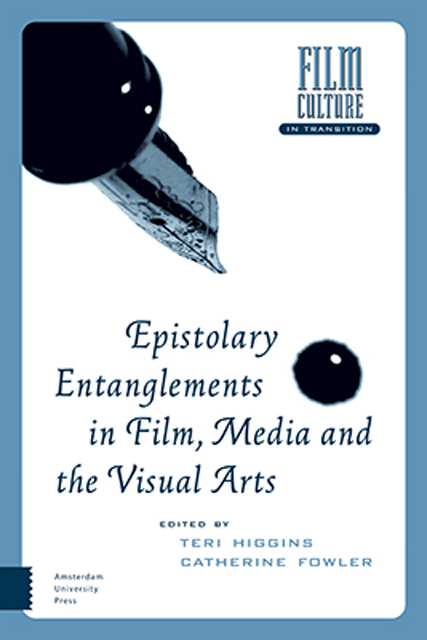Book contents
- Frontmatter
- Table of Contents
- Acknowledgements
- Doing (Audio-Visual) Things with Words – From Epistolary Intent to Epistolary Entanglements: An Introduction
- 1 Performance and Power : The Letter as an Expression of Masculinity in Game of Thrones
- 2 ‘My dearest little girl, I just got your letter and I hope that you will continue to write to me often’: Epistolary Listening in News from Home (Chantal Akerman, 1976)
- 3 Dead Letters: Epistolary Hauntology and the Speed of Light in Personal Shopper (Olivier Assayas, 2016)
- 4 Attention to Detail: Epistolary Forms in New Melodrama
- 5 The Spiritual Intimacies of The Red Hand Files: How Long Will I Be Alone?
- 6 Video Authenticity and Epistolary Self-Expression in Letter to America (Kira Muratova, 1999)
- 7 Epistolary Affect and Romance Scams: Letter from an Unknown Woman
- 8 Delivering Posthumous Messages : Katherine Mansfield and Letters in the Literary Biopic Leave All Fair (John Reid, 1985)
- 9 The Interactive Letter : Co-Authorship and Interactive Media in Emily Short’s First Draft of the Revolution
- 10 Epistolary Distance and Reciprocity in José Luis Guerín and Jonas Mekas’s Filmed Correspondences
- 11 Instagram and the Diary : The Case of Amalia Ulman’s Excellences & Perfections (2014)
- 12 Civil War Epistolary and the Hollywood War Film
- 13 Epistolarity and Decolonial Aesthetics in Carola Grahn’s Look Who’s Talking (2016)
- 14 Epistolary Relays in Fatih Akin’s Auf der anderen Seite (On the Other Side/On the Edge of Heaven) (2007)
- Index
12 - Civil War Epistolary and the Hollywood War Film
Published online by Cambridge University Press: 20 June 2023
- Frontmatter
- Table of Contents
- Acknowledgements
- Doing (Audio-Visual) Things with Words – From Epistolary Intent to Epistolary Entanglements: An Introduction
- 1 Performance and Power : The Letter as an Expression of Masculinity in Game of Thrones
- 2 ‘My dearest little girl, I just got your letter and I hope that you will continue to write to me often’: Epistolary Listening in News from Home (Chantal Akerman, 1976)
- 3 Dead Letters: Epistolary Hauntology and the Speed of Light in Personal Shopper (Olivier Assayas, 2016)
- 4 Attention to Detail: Epistolary Forms in New Melodrama
- 5 The Spiritual Intimacies of The Red Hand Files: How Long Will I Be Alone?
- 6 Video Authenticity and Epistolary Self-Expression in Letter to America (Kira Muratova, 1999)
- 7 Epistolary Affect and Romance Scams: Letter from an Unknown Woman
- 8 Delivering Posthumous Messages : Katherine Mansfield and Letters in the Literary Biopic Leave All Fair (John Reid, 1985)
- 9 The Interactive Letter : Co-Authorship and Interactive Media in Emily Short’s First Draft of the Revolution
- 10 Epistolary Distance and Reciprocity in José Luis Guerín and Jonas Mekas’s Filmed Correspondences
- 11 Instagram and the Diary : The Case of Amalia Ulman’s Excellences & Perfections (2014)
- 12 Civil War Epistolary and the Hollywood War Film
- 13 Epistolarity and Decolonial Aesthetics in Carola Grahn’s Look Who’s Talking (2016)
- 14 Epistolary Relays in Fatih Akin’s Auf der anderen Seite (On the Other Side/On the Edge of Heaven) (2007)
- Index
Summary
Abstract
This chapter explores the concept of ‘soldier-as-witness’. Following a brief history of the influence of epistolary traditions in war films from early film to the present, noting the shift from letter correspondence as ‘an enduring genre code of the war film’ pre-sound, to the domination of soldier testimony through voice-over after sound, it argues that epistolary accounts create a more informed narration and affect the emotional content of war films. Finally, through an analysis of the documentary film, Restrepo (Tim Hetherington, Sebastian Junger, 2010), the chapter considers the soldier narrative as a counter to war reporting, leveraging epistolary testimonies and creating authentic ‘microhistories’ to supplement the visual coding of war.
Keywords: war films; D.W Griffith; documentary; witness; soldier narrative
In 1895, the same year as Edison's and the Lumière brothers’ early film exhibitions, Stephen Crane, a 22-year-old bohemian New Yorker – a man who had never witnessed combat in his life – published The Red Badge of Courage. The novel was heralded as a graphic and compelling account of the United States Civil War, told through the eyes of a young Union private and based largely on accounts from veterans, historians, and a popular postwar anthology, Battles and Leaders of the Civil War, a collection of essays and personal diary entries from both Union and Confederate veterans.1 Crane's novel, the story of Union private Henry Fleming's soldiering life, narrates the Civil War in first person and is informed by the emotive capacity and authoritativeness of first-person accounts of soldiers who fought the war. First-person testimonials, preserved in the letters and diaries of Civil War soldiers, evoked in Crane's novel, serve as competing histories to the ones written by historians and journalists. These competing histories can be read as counter-histories – alternative accounts that challenge the work of war journalists and even pictorial accounts – on the basis that a firsthand account serves as a more authoritative narrative of events.
More than a century later, in an early scene in Saving Private Ryan, General Marshall, while ordering the mission to find the missing James Ryan, reads aloud ‘The Bixby Letter’, words of condolences written by Abraham Lincoln to bereaved mother Lydia Bixby:
I have been shown in the files of the War Department a statement of the Adjunct General of Massachusetts that you are the mother of five sons who have died gloriously on the field of battle.
- Type
- Chapter
- Information
- Epistolary Entanglements in Film, Media and the Visual Arts , pp. 225 - 240Publisher: Amsterdam University PressPrint publication year: 2023



